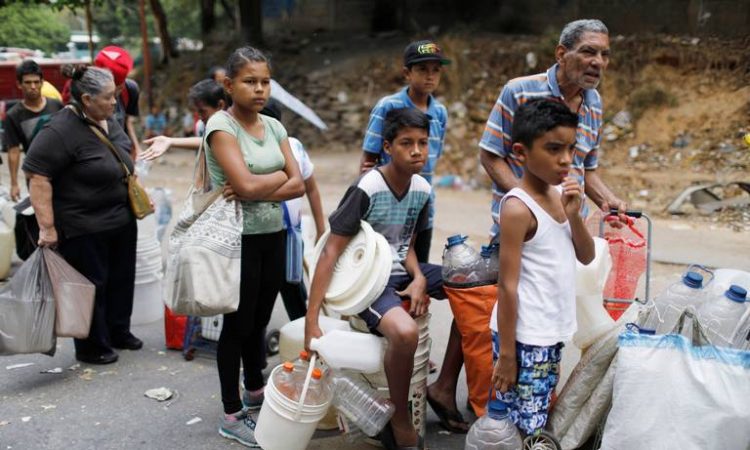Venezuelans protest in the streets before new blackouts that hit another part of the country

Venezuelans began another tough week amid high tensions, growing protests over electricity blackouts and orders by the Nicolás Maduro regime to paramilitary groups to use guns to disperse the protests after they nearly reached the presidential palace.
The violence, during which tear gas was fired at homes and two people were wounded, erupted after Maduro went on nationwide television and ordered “peace squadrons” to take control of the streets.
Maduro issued the order Sunday, the same day he announced a drastic plan for power rationing. Hours later, residents near the Miraflores presidential palace in Caracas began protesting the shortages of water, food and electricity and closed the main streets in the area for hours, surrounding the palace.
The neighborhoods around the presidential palace were long considered to be loyal to Maduro’s predecessor, the late Hugo Chávez, and no protests had been staged there for years.
Residents who closed the Armed Forces Avenue, a key boulevard two blocks from the palace, were dispersed with gunfire. Two people were shot and wounded during the protests, according to local media reports.
To the south, in an area known as el Valle, the National Guard ordered in armored personnel carriers and fired tear gas at residents who had blocked the streets.
The Guardsmen were backed up by members of the Special Action Forces, a feared unit accused before international organizations of being involved in extrajudicial executions.
The SAF, National Guard and paramilitary groups known in Venezuela as colectivos have been activated amid Venezuelan’s growing discontent with the government.
The independent organization, Foro Penal, alleged on Monday that the principal players in the violence were again armed civilians who support Chavismo — another way of describing the colectivos.
National Assembly President Juan Guaidó, who is internationally recognized as interim president, said Sunday night that armed civilians had opened fire on anti-Maduro protesters and wounded two people in central Caracas.
“He’s a murderer. There is a direct responsibility here, and it’s not something that started yesterday,” Guaidó told journalists Monday, referring to Maduro.
Already beset by inflation that hit more than 2 million percent, Venezuelans are now being hammered by the collapse of the electricity system and interruptions of water supplies.
In a rare acknowledgment of the gravity of the problem, Maduro on Sunday announced a nationwide electricity rationing plan that will last at least 30 days.
“We’re in a very grave situation,” said Maduro, who again blamed a U.S. government viral attack for the blackouts. “The blow was directly against the Guri generating system … Friday at 7:28pm we suffered a brutal attack against the transmission lines … electromagnetic elements and infectious elements to damage the system from the inside,” he said.
Venezuelans are protesting with increasing intensity the deterioration of their quality of life and Maduro’s failure to announce concrete steps to deal with the crisis. Instead of calming down the population, his words have sparked more street protests and public criticisms.
The daily El Chiquire Bipolar, known for its satire, summed up the situation with this headline in Spanish: “Maduro announces rationing of existence.”
“I have to go to the street to get a bucket of water just to bathe my daughters and make dinner. It’s not right. Nicolás Maduro is an ignorant person, and what he wants is for us to suffer,” a woman who identified herself as Belkys Bozo told the digital news channel VPI on Monday.
“And this situation is here to stay,” said Luis Felipe Gómez, a trucker who sells large containers of water in eastern Caracas for 5,000 bolivares (roughly $1.50), which is more than a week of the minimum salary. Amid a shortage of cash, he accepts bank transfers that take a long time.
Dishonest Venezuelans are also taking advantage of the situation. Anahiz, a retired bank employee who asked that her last name not be published for fear of reprisals, said she almost paid $100 for a tanker of water for her four-bedroom house that she was told should be worth no more than $20. Venezuela has some of the world’s largest aquifers, but the water shortages have become a daily topic of conversation.
The government apparently has no way to resolve the power blackouts, which have left more than 90 percent of the country without electricity intermittently. In turn, that has impacted the potable water and cellphone systems and internet service, as well as the majority of commercial activities that depend largely on electronic transfer because of the hyperinflation.
The gradual collapse of the electricity and water systems is inevitable, said Diego Moya-Ocampos, London-based Latin America analyst for IHS Markit.
“This is the direct result of years of falling short on investments and maintenance of the electrical generation and distribution system,” said Moya-Ocampos. “That provoked incidents and interruptions in the service for years, and it finally collapsed.”
“Resolving that crisis requires huge investment that are impossible in Venezuela because of the current risks, since the government today has no access to foreign financing,” he added.
With informatión of MiamiHerad







